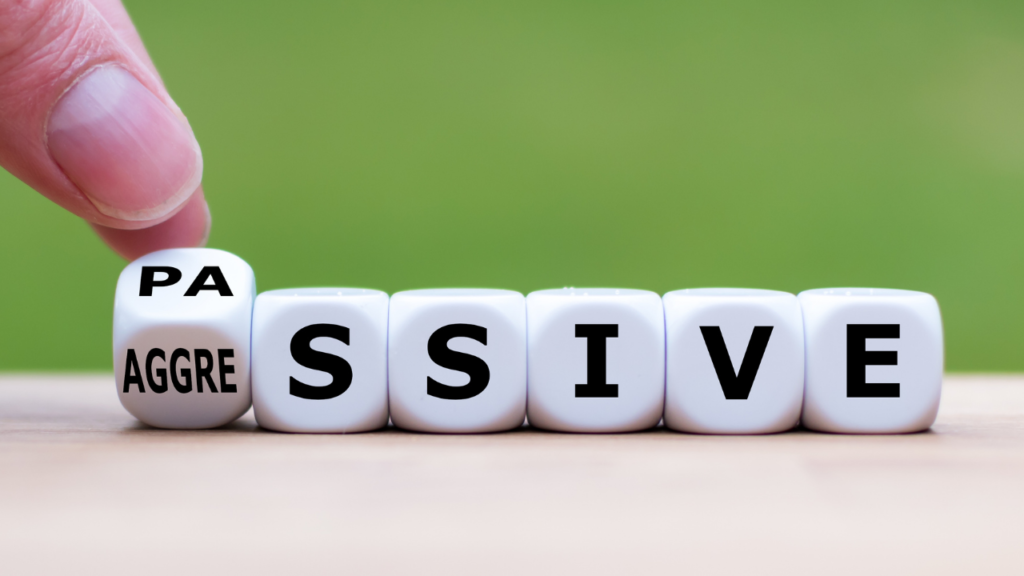For most people, picking out aggressive communicators is simple. That’s because it’s easy to pinpoint the hurt that results from a conversation with someone who is aggressive. I’m sure we all know what it feels like to be offended, or attacked, during a conversation. However, has someone around you ever made you feel awkward or uncomfortable, but you couldn’t exactly figure out why you were feeling that way? This can occur often with certain people in your life, both personally and professionally. It is a classic behavior of a passive-aggressive communicator.
The Passive Side of Passive-Aggressive Humans
Someone who is passive-aggressive often “beats around the bush” when communicating his or her point. Often, along the way, there are indirect and subtle insults mixed in to throw you off. Being passive while communicating yields a “go with the flow” attitude. Similar to aggressive communicators, passive communicators are easy to spot as well. They are the ones avoiding conflict and saying “sure” or “yes” to everything.
Mixed Signals of the Passive-Aggressive Communicator
Being indirect alone doesn’t make one’s behavior passive-aggressive. When a communicator also displays subtle jabs of hostility in addition to the aloof, passive vibe, this is an example of passive-aggressive behavior. A passive-aggressive communicator often keeps you guessing and makes you so unsure of yourself that your self-confidence suffers. You might be left feeling hurt, confused and even hopeful…and that is exactly how a passive-aggressive communicator wants you to feel!
How do you know if someone is a passive-aggressive communicator?

To help identify (and combat, if you will) a passive-aggressive counterpart, look for these key factors:
1. You are being given the silent treatment (at home or at your place of work):
This can mean someone is clearly ignoring you and your entire presence, or it can be less pronounced. In the workplace, for example, a particular person might ignore you at a meeting, or even in passing. You may not be completely sure whether it’s in your head or not, as this other person will most likely strategically place his or her inattentiveness. This is passive-aggressive communicating in one of it’s most stealthy forms.
2. Someone is constantly, elusively putting you down:
As I alluded to earlier, passive-aggressive communicators will often not insult you directly. Because subtle insults are more difficult to decipher, passive-aggressive contenders believe they are pulling one over on you or even that they aren’t slighting you at all. Some play this game with sarcasm, which can be, in my opinion, the hardest communication aspect of them all! You never know if the person is serious, if they are building you up or poking fun at you.
3. You get an offensive and cheeky vibe from someone:
It’s anything but comfortable to be in the vicinity of people who are just barely approachable. When someone is consistently grouchy, pouty or just in a less than favorable mood, it can be confusing at first. Are you supposed to feel sorry for them? Maybe you should console them or sulk alongside them? Nope. These people are just exhibiting a form of passive-aggressive behavior. Basically, they are communicating to you that they don’t know how to, or don’t want to, interact with you. You might even see this in someone in your workplace who complains about things that are really not that substantial. If it rubs you the wrong way, chances are you are not a passive-aggressive communicator. If you commiserate with said co-worker, then, well…
4. Someone who is always acting like a butthead:
Yes, that’s right, a butthead. I’m sure we all have a different definition of this word, but to me, this is what it means to be stubborn, yet persistent, when it comes to any old issue at all. Maybe it’s to get a rise out of someone, or just to annoy the living daylights out of him or her. Either way, it’s passive-aggressive behavior and, in the end, can be very hurtful. While it’s okay to be tenacious in some instances, like when you’re standing up for something you truly believe in, everyday encounters with a tenacious individual can be exhausting!
5. A person who continually fails to take care of responsibilities:
When kids are unable to concentrate and complete a task, it’s likely that the culprit is their age and lack of practice. They will either learn as they live or be given a pass because they are kids. However, there’s an “old” saying that goes a little something like this: “Say what you mean and mean what you say.” An adult who doesn’t hold up this little prophecy is seen as irresponsible, and in a way, passive-aggressive. Someone who is “all talk,” will deliberately passes responsibility on to others. They may fail to complete tasks that other people are counting on them for, and this is a display of passive-aggressive behavior for sure.
Dealing With Passive Aggression
Are you wondering what the best way is to handle passive-aggressive behavior? Well, in my experience, confronting the culprit does not go over very well. Chances are, the person knows they are being a “butthead” and might even be gaining satisfaction from said behavior. It’s possible that bringing it up may fuel the fire, so to say, and make matters worse.
How to mentally tackle a passive-aggressive person…
A method that I’ve found to be successful is to disregard a passive-aggressive person’s performance. Trick the person (not in a devious way) into believing that you are unaware of their behavior. If it doesn’t seem to upset you, and you have little to no response, where is the thrill? Your lack of feedback (which would normally feed the fire) has the potential to eliminate the passive-aggressive behavior altogether!
Is ignoring passive-aggressive behavior possible?
Sometimes, completely overlooking passive-aggressive communicators just isn’t realistic. Maybe it’s been a constant struggle with this person and you have been whittled down daily and just can’t muster up the courage to “do nothing.” If this is the case, do your best to avoid this person as much as possible. Limit interactions and don’t even give them the chance to make you feel less than what you deserve! If it’s someone you work with, speak to someone up your chain of command. If it’s someone in your personal life, speak to a friend, or even a therapist, for ways to manage your communications.





